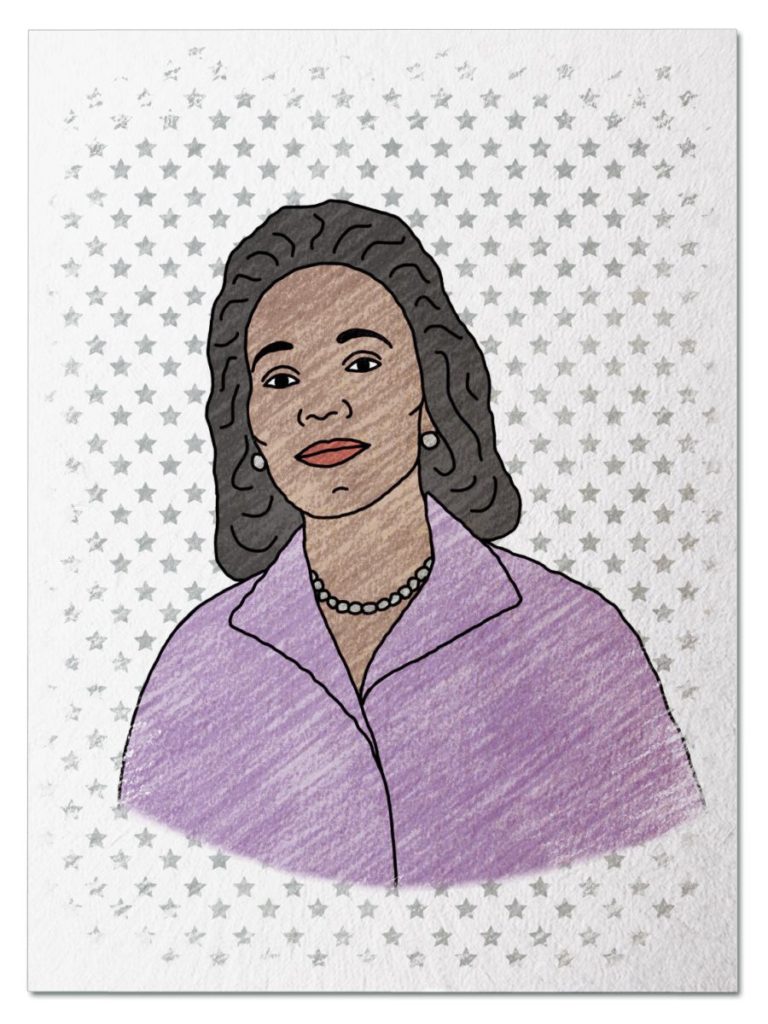
Culture Changer
She grew up surrounded by music, learned to sing and play several instruments, and was directing her church’s choir when she was only 15 years old. And when she grew up, she used her education and musical talent to host Freedom Concerts – and gave all proceeds to the Civil Rights Movement. Her performances attracted packed audiences and helped make MLK’s work possible. Travel back in time to Manhattan Center in 1956 and meet Coretta Scott King…
Her Ruby Shoe Moment
The Power of the Wand
Her Yellow Brick Road
Brains, Heart & Courage
Glinda’s Gallery
Just the Facts
Her Ruby Shoe Moment
Coretta Scott King stepped onto the stage at the Manhattan Center in New York City. It was December 5, 1956 and she was performing at a benefit concert called “Salute to Montgomery.” The concert was held on the one year anniversary of the start of the Montgomery bus boycott. The goal was to raise money for the Montgomery Improvement Association, to help people who suffered economically as a result of the boycott.
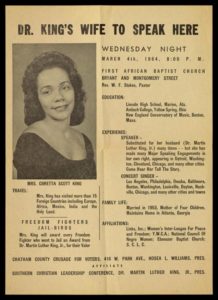 Coretta sang classical pieces, spirituals, and freedom songs. She also told the story of Montgomery, the birth of the Civil Rights Movement, as well as the long history of oppression suffered by various groups of people throughout history. She also shared her dream of a new America where “freedom, justice and equality shall become a reality for every man, woman, and child.” And her faith that God will lead the way. She spoke about the dignity and power that one can achieve through nonviolent protests.
Coretta sang classical pieces, spirituals, and freedom songs. She also told the story of Montgomery, the birth of the Civil Rights Movement, as well as the long history of oppression suffered by various groups of people throughout history. She also shared her dream of a new America where “freedom, justice and equality shall become a reality for every man, woman, and child.” And her faith that God will lead the way. She spoke about the dignity and power that one can achieve through nonviolent protests.
Coretta performed for a packed audience alongside celebrity musicians such as Harry Belafonte and Duke Ellington. And it was a successful fundraiser — nearly $2,000 was raised for the Montgomery Improvement Association (a lot of money at the time). The concert inspired Coretta, and helped her realize that she could use her musical talent to support her commitment to nonviolent social activism.
A few years later, Coretta decided to develop her own concert series to raise money for the Civil Rights Movement. She designed her own format for the program — weaving dramatic storytelling with poetry and a variety of songs. In her concerts, Coretta educated the audience about the hardships suffered by Blacks in the South. She also protested against Jim Crow laws and white supremacy. And she shared a message of hope that change was possible.
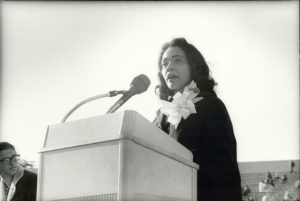
Coretta speaking in 1998 (Smithsonian Institute)
On November 15, 1964, Coretta performed her first Freedom Concert at Town Hall in New York City. Before long, she was in demand around the country. She gave more than 30 concerts over the next 3 years — from Chicago to Los Angeles to Baltimore to Boston. It was a tough schedule, but she was committed to their cause.
Coretta donated all the proceeds from her Freedom Concerts to the Southern Christian Leadership Conference (her husband, Martin Luther King Jr was its president). And those donations were critical to the mission of SCLC, providing it with the ability to hire staff, pay for travel expenses, and cover legal fees for protestors.
Coretta’s Freedom Concerts became a major source of funding for the Civil Rights Movement. And her musical talent provided her husband with the money needed to pursue his dream of liberating Black Americans from the segregation and discrimination of the Jim Crow South.
The Power of the Wand
After her husband’s death, Coretta was determined to continue his work. She stepped up as a leader in the Civil Rights Movement and began to speak out about other issues important to her as well — the Vietnam War, apartheid in South Africa, women’s rights, LGBTQ rights, and world peace.
Coretta’s commitment to Ghandian nonviolence and her husband’s legacy led her to establish the King Center for Nonviolent Social Change. She served as its president until 1994, when their son, Dexter took over. Their daughter, Dr. Bernice King, currently serves as its CEO.
Her Yellow Brick Road
In 1951, Coretta arrived in Boston with 15 dollars in her pocket and a dream of becoming a concert musician. She received a scholarship to the New England Conservatory of Music and studied with famous opera singer, Madame Marie Sundelius.
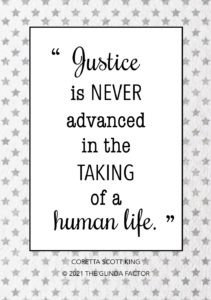 During her second semester at the Conservatory, Coretta’s friend set her up on a date that would change her life. Martin Luther King, Jr was a PhD student at Boston University’s School of Theology. It was a whirlwind romance and they married about 18 months later.
During her second semester at the Conservatory, Coretta’s friend set her up on a date that would change her life. Martin Luther King, Jr was a PhD student at Boston University’s School of Theology. It was a whirlwind romance and they married about 18 months later.
After Coretta received her degree in violin and voice from the Conservatory, Martin accepted a job as pastor of Dexter Avenue Baptist Church in Montgomery, Alabama. Before long, Martin became involved in the Montgomery bus boycott. It was a tense time in the city and their family was threatened on a regular basis.
On January 30, 1956, Coretta learned how far white citizens would go to stop the new Civil Rights Movement. She had just put their infant daughter, Yolanda, to bed and was chatting with a friend when she heard a loud thump on the front porch. She raced to the next room as a bomb exploded and ripped off the front of their house.
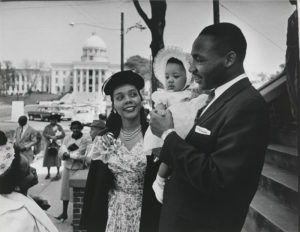
Coretta and MLK with daughter, Yolanda (Smithsonian Institute)
All the grandparents wanted Coretta and baby Yolanda to leave Montgomery until the bus boycott was over. But she found inner strength she didn’t know she had. Coretta refused to run away. Her place was leading the Civil Rights Movement with Martin. It was time to put her pacifist beliefs into action.
Coretta went on become an integral part of the Civil Rights Movement — both as Martin’s wife and in her own right. She was involved in most milestones such as the Montgomery bus boycott, Selma march, March on Washington, and the Civil Rights Act of 1964. And Coretta knew she was part of history in the making. She organized and maintained all of Martin’s papers for posterity. She was a sounding board for Martin’s sermons. She critiqued his speeches. She was sought after as a public speaker. She was a leader in a number of women’s organizations. And she used her musical talent to further the cause.
Brains, Heart & Courage
Coretta grew up in rural Alabama with three siblings on the family farm. They were lucky to own the land — her grandfather had bought the farm after the Civil War ended. Coretta and her siblings started to work the fields and help care for the animals by the time they were 6 years old. When the Great Depression hit, Coretta also picked cotton by hand for $2 per week at neighboring farms.
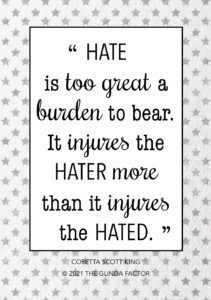 When she was 15 years old, Coretta’s family lost everything. Their house burned to the ground on Thanksgiving night, 1942. Her parents smelled smoke around bedtime and they were lucky to all escape. There was nothing to do but watch it burn — they had no phone. Even if they could call the fire department, no one would arrive to help a Black family. The fire was never investigated and no one was ever prosecuted. That was life in the Jim Crow South.
When she was 15 years old, Coretta’s family lost everything. Their house burned to the ground on Thanksgiving night, 1942. Her parents smelled smoke around bedtime and they were lucky to all escape. There was nothing to do but watch it burn — they had no phone. Even if they could call the fire department, no one would arrive to help a Black family. The fire was never investigated and no one was ever prosecuted. That was life in the Jim Crow South.
A few years later, Coretta’s father had saved enough money to open his own lumber mill. About 2 weeks after he finished building the mill, a logger came by and asked to buy it. He refused and the mill was burned to the ground a few days later. He was determined to own his own business, however. The following year, he opened a grocery store right next to their home (which he had re-built). Eventually, he added a gas station. He operated the store for 40 years, until the day he died.
Coretta’s family was very religious and their life was filled with music. Her musical talent became obvious at a young age. She sang solos and duets with her sister regularly in church, and started to direct the church choir at age 15. In high school, Coretta played the trumpet and piano, sang in the school choir, and performed in a number of musicals.
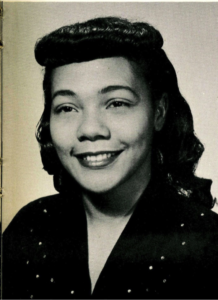
Coretta at New England Conservatory (NEC.org)
Coretta attended a one-room elementary school in her small town. Then, she attended Lincoln Normal School in nearby Marion for high school. It was a segregated school that was founded by former slaves. She stayed with other families during the school year, since it was 10 miles away and they didn’t own a car. It was an eye opening experience for her – all the students were treated with respect (even by the white teachers).
Coretta graduated first in her class in 1945 and received a scholarship to Antioch College in Ohio. She loved it there — her liberal arts education expanded her worldview and the opportunities for student activism led her to become a pacifist. After six years at Antioch, Coretta graduated with a bachelor’s degree in music and education. She was ready to move on.
Glinda’s Gallery
Just the Facts
- Coretta Scott was born on April 27, 1927 in her parents home in Heiberger, Alabama. She had 3 siblings — Edyth, Eunice, and Obadiah. Life was hard in the rural South, and they felt constantly threatened by the white community.
- Coretta graduated as valedictorian of her class at Lincoln Normal School in 1945. She attended both Antioch College and New England Conservatory of Music on scholarships.
- Martin Luther King, Jr. and Coretta married on June 18, 1953 at her family home. They had four children — Yolanda, Martin, Dexter, and Bernice.
- When her husband was assassinated in 1968, Coretta was back home taking care of their children. She traveled to Memphis to finish his work there by leading the sanitation workers march. Her work helped to launch the Poor People’s Campaign.
- In 1968, Coretta founded the King Center for Nonviolent Social Change in Atlanta. She was its president and CEO from its creation until 1994, when she passed the reigns to her son, Dexter.
- Coretta also worked to have MLK’s childhood neighborhood in Atlanta designated as a historical district. Today, the area is Martin Luther King Jr. National Historic Park.
- For many years, Coretta lobbied to have her husband’s birthday declared a national holiday. She was finally successful on November 2, 1983, when Ronald Reagan signed legislation to establish the third January of every year as Martin Luther King Jr. Day.
- Coretta received many awards over her lifetime, including the Ghandi Peace Prize in 2004. She also received honorary doctorates from over 50 colleges and universities and was involved in a number of advocacy organizations.
- The Coretta Scott King Book Award honors African American authors and illustrators of books for children and young adults. It has been awarded by the American Library Association annually since 1970.
- In 2007, the Coretta Scott King Center for Cultural and Intellectual Freedom opened at her alma mater, Antioch College. Its mission is to facilitate “learning, dialogue, and action to advance social justice.”
- Coretta died on January 30, 1986 from complications related to ovarian cancer. She was 78 years old.
Want to Know More?
Applebome, Peter. “Coretta Scott King, a Civil Rights Icon, Dies at 78,” The New York Times, February 1, 2006.
King, Coretta Scott and Rev. Dr. Barbara Reynolds. Coretta: My Life, My Love, My Legacy. New York City: Henry Holt & Co. (2017).
King, Coretta Scott. My Life with Martin Luther King Jr. New York City: Henry Holt & Co (republished in 1993).
“Coretta Scott King,” The King Center (https://thekingcenter.org/about-tkc/about-mrs-king/)
The Coretta Scott King Center for Cultural and Intellectual Freedom at Antioch College (https://antiochcollege.edu/coretta-scott-king-center/)
“Coretta Scott King,” The Martin Luther King Jr Research and Education Institute at Stanford University (https://kinginstitute.stanford.edu/encyclopedia/king-coretta-scott)
